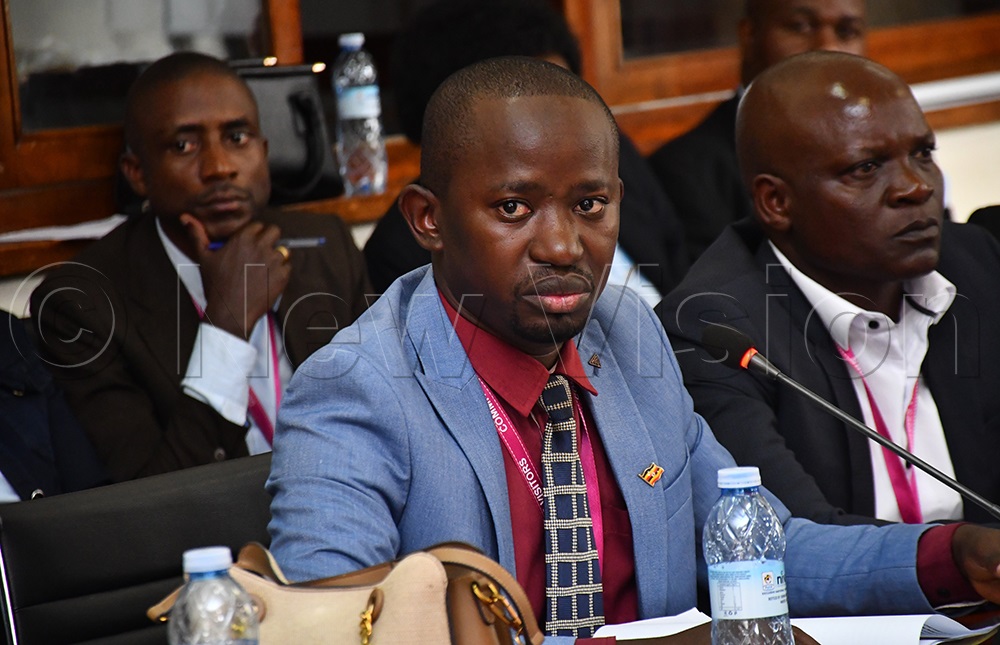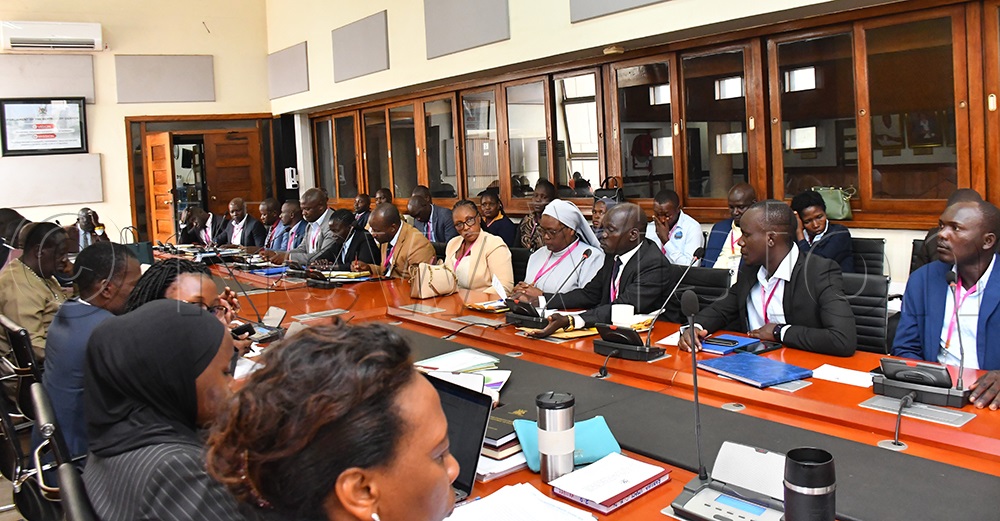MPs back sports officers' fight for fair pay
Under the current structure, these professionals serve as heads of sports units at the local government level without assistants or senior positions. Leaving them with no opportunities for career growth, except in cities that have recently been restructured to include senior roles.
Education committee chairperson James Kubeketerya chairing the committee on Wednesday. (Photo by Edith Namayanja)
By Dedan Kimathi
Journalists @New Vision
_________________
Sports officers in the country have renewed their demands to be placed on the science salary scale.
In addition, they want their commensurate arrears, based on what they would have been earning, paid from the time they were first employed up to the date of implementation.
Under the current structure, these professionals serve as heads of sports units at the local government level without assistants or senior positions. Leaving them with no opportunities for career growth, except in cities that have recently been restructured to include senior roles.
Mustafa Nsubuga, the President of the National Sports Officers Association (NSOA), echoed this while interfacing with Parliament’s Education and Sports committee, chaired by Bunya East MP James Kubeketerya (NRM) on Wednesday, September 10, 2025. He was flanked by Cleophas Musinguzi, the general secretary of the body.
Something, he said, demotivates their colleagues who know that they cannot rise to become Senior Inspector of Schools and DEOs despite having the required experience.
“For example, the first female sports officer, Ms Tumuhairwe Teopista of Kabarole District, served for 20 years until she retired. We have our own Osapat from Mayuge who has been a sports officer since 1993 and has not been promoted at any level of Government,” Nsubuga argued.
Disparities in pay
Nsubuga says that currently, sports officers are recruited on a U4 Lower scale and retire with the same pay. And yet, according to a witness who did not want his name to be disclosed, this translates to a monthly salary of sh600,000 subject to tax. While their Science counterparts in the education sector earn sh4 million per month.
“These, by no doubt, are Science qualifications. If you want to qualify for the Bachelor of Science in Sports Science, Bachelor of Education with a bias in Physical Education, the person should have done biology, chemistry, physics and mathematics at the Ugandan Advanced Level of education or mathematics and physical education at diploma level, especially for primary school teachers,” he explained.
Mustapha Nsubuga, the president National Sports Officers' Association, before the Education Committee on Wednesday. (Photo by Edith Namayanja)
He added that the training of sports officers at universities is purely scientific, covering units such as human anatomy, sports biochemistry, biomechanics, nutrition, and injury prevention and management, among others.
President Museveni's Directive
It should be noted that during a teacher’s retreat at State House in 2017, President Yoweri Museveni promised to increase the salaries of science teachers. The directive whose implementation commenced in 2021, saw Graduate and Grade V teachers’ pay increase to sh4 million and sh3 million, up from sh1.1 million and sh796,000 respectively.
However, for sports officers, the case was different, with many officials in public service contesting their scientific status. This prompted the then Permanent Secretary of the Ministry of Education and Sports (MoES) in 2020 to write to Makerere University seeking clarification on whether the affected officers qualified as scientists by admission, training or award.
Dr Annet Nankwanga, who was then the head of department of sports science at Uganda’s oldest higher learning institution confirmed their status as scientists. Nankwanga is a PhD holder in physiotherapy.
“The error of trial and guessing in sports ended in the 20th century. With the 21st century, more and more science has found its home in sports. That even the injuries are assessed scientifically to ascertain the magnitude and the time needed for recovery…” she argued.

Education Committee meeting with teachers on Wednesday. (Photo by Edith Namayanja)
However, despite this expert opinion, nothing changed in their fortunes, a situation Nsubuga described as double standards.
“The Ministry of Public Service of Uganda has refused to include sports officers at Local Government, Cities and Municipalities, forces, universities and other tertiary institutions, including the department of PES at the Ministry of Education and Sports. Yet the same ministry of Public Service considered personnel with the same qualification serving as teachers and tutors in secondary schools and colleges as directed by His Excellency the President,” he wondered.
Other correspondences
Correspondence seen by New Vision shows that on July 23, 2020, while still serving as State Minister for Sports, Government Chief Whip David Hamson Obua raised the same concerns with the Minister of Education and Sports, First Lady Janet Kataaha Museveni.
MPs react
To many MPs, including Ismail Muhammad Lomwar (NRM) on the Education Committee, this was disheartening given the unifying role of sports. “When it is time for sports, we all become Ugandans, whether you are from the Eastern part or whichever part,” he pointed out.
He added that this points to the collapse of sports departments in the country, noting that he has never witnessed vigorous sporting activities in his political backyard. The only time schools reach out to him, he said, is when they are soliciting money to participate in national competitions.
Supplementing, Kashari South MP Nathan Itungo (Indep) described the situation as shameful, particularly at this time. Adding that sports has medical benefits and has proven to be a sector capable of employing multitudes of youth if well supported.
“The last point is about tourism. For those who watch sports channels on DStv, when you see Mandela Stadium on screen, you might even think it is not in Uganda, with all the flags and fans cheering the Cranes. Even now, on Channel 220, where they run sports highlights, Uganda Cranes recently played Mozambique live, and then Somalia. If you don’t want to promote sports, then you are not promoting Uganda,” Itungo argued.
Funding gap
Fast forward, sports officers now face funding constraints as they carry out community and school education without transport facilities.
Many of them say they would at least need motorcycles. Among other demands, they want the Government to increase sports grants at local governments to sh150 million per entity, and to recruit at least 15 trained sports officers as coaches in each public university, in line with requirements of the recently enacted National Sports Act, which requires every university to have a minimum of fifteen sports disciplines.